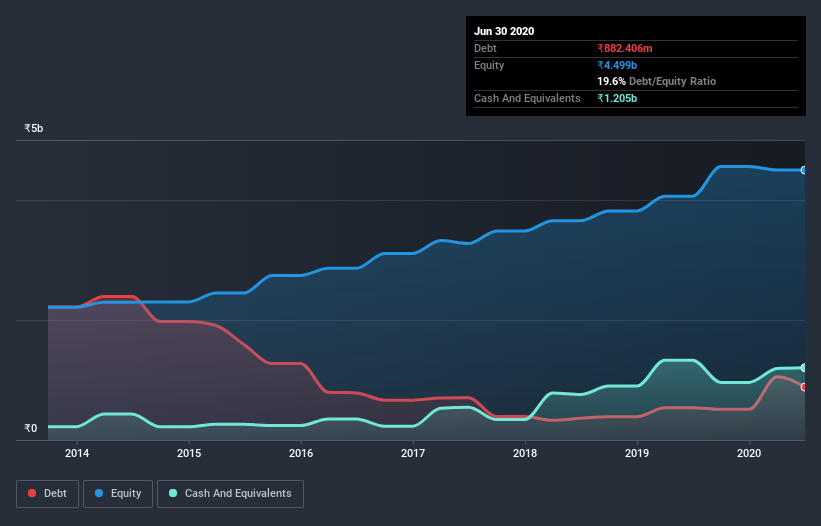- India
- /
- Basic Materials
- /
- NSEI:DECCANCE
Deccan Cements (NSE:DECCANCE) Has A Somewhat Strained Balance Sheet

Legendary fund manager Li Lu (who Charlie Munger backed) once said, 'The biggest investment risk is not the volatility of prices, but whether you will suffer a permanent loss of capital.' When we think about how risky a company is, we always like to look at its use of debt, since debt overload can lead to ruin. As with many other companies Deccan Cements Limited (NSE:DECCANCE) makes use of debt. But the more important question is: how much risk is that debt creating?
When Is Debt Dangerous?
Debt is a tool to help businesses grow, but if a business is incapable of paying off its lenders, then it exists at their mercy. In the worst case scenario, a company can go bankrupt if it cannot pay its creditors. However, a more usual (but still expensive) situation is where a company must dilute shareholders at a cheap share price simply to get debt under control. Of course, plenty of companies use debt to fund growth, without any negative consequences. The first thing to do when considering how much debt a business uses is to look at its cash and debt together.
Check out our latest analysis for Deccan Cements
How Much Debt Does Deccan Cements Carry?
You can click the graphic below for the historical numbers, but it shows that as of March 2020 Deccan Cements had ₹880.6m of debt, an increase on ₹539.5m, over one year. However, it does have ₹1.21b in cash offsetting this, leading to net cash of ₹324.7m.

How Strong Is Deccan Cements's Balance Sheet?
Zooming in on the latest balance sheet data, we can see that Deccan Cements had liabilities of ₹1.39b due within 12 months and liabilities of ₹1.22b due beyond that. On the other hand, it had cash of ₹1.21b and ₹488.7m worth of receivables due within a year. So its liabilities total ₹911.9m more than the combination of its cash and short-term receivables.
This deficit isn't so bad because Deccan Cements is worth ₹4.06b, and thus could probably raise enough capital to shore up its balance sheet, if the need arose. However, it is still worthwhile taking a close look at its ability to pay off debt. While it does have liabilities worth noting, Deccan Cements also has more cash than debt, so we're pretty confident it can manage its debt safely.
In fact Deccan Cements's saving grace is its low debt levels, because its EBIT has tanked 40% in the last twelve months. When a company sees its earnings tank, it can sometimes find its relationships with its lenders turn sour. There's no doubt that we learn most about debt from the balance sheet. But you can't view debt in total isolation; since Deccan Cements will need earnings to service that debt. So when considering debt, it's definitely worth looking at the earnings trend. Click here for an interactive snapshot.
Finally, while the tax-man may adore accounting profits, lenders only accept cold hard cash. While Deccan Cements has net cash on its balance sheet, it's still worth taking a look at its ability to convert earnings before interest and tax (EBIT) to free cash flow, to help us understand how quickly it is building (or eroding) that cash balance. In the last three years, Deccan Cements created free cash flow amounting to 7.3% of its EBIT, an uninspiring performance. For us, cash conversion that low sparks a little paranoia about is ability to extinguish debt.
Summing up
Although Deccan Cements's balance sheet isn't particularly strong, due to the total liabilities, it is clearly positive to see that it has net cash of ₹324.7m. So while Deccan Cements does not have a great balance sheet, it's certainly not too bad. When analysing debt levels, the balance sheet is the obvious place to start. However, not all investment risk resides within the balance sheet - far from it. To that end, you should be aware of the 2 warning signs we've spotted with Deccan Cements .
If you're interested in investing in businesses that can grow profits without the burden of debt, then check out this free list of growing businesses that have net cash on the balance sheet.
If you’re looking to trade Deccan Cements, open an account with the lowest-cost* platform trusted by professionals, Interactive Brokers. Their clients from over 200 countries and territories trade stocks, options, futures, forex, bonds and funds worldwide from a single integrated account. Promoted
New: Manage All Your Stock Portfolios in One Place
We've created the ultimate portfolio companion for stock investors, and it's free.
• Connect an unlimited number of Portfolios and see your total in one currency
• Be alerted to new Warning Signs or Risks via email or mobile
• Track the Fair Value of your stocks
This article by Simply Wall St is general in nature. It does not constitute a recommendation to buy or sell any stock, and does not take account of your objectives, or your financial situation. We aim to bring you long-term focused analysis driven by fundamental data. Note that our analysis may not factor in the latest price-sensitive company announcements or qualitative material. Simply Wall St has no position in any stocks mentioned.
*Interactive Brokers Rated Lowest Cost Broker by StockBrokers.com Annual Online Review 2020
Have feedback on this article? Concerned about the content? Get in touch with us directly. Alternatively, email editorial-team@simplywallst.com.
About NSEI:DECCANCE
Moderate second-rate dividend payer.
Similar Companies
Market Insights
Community Narratives




